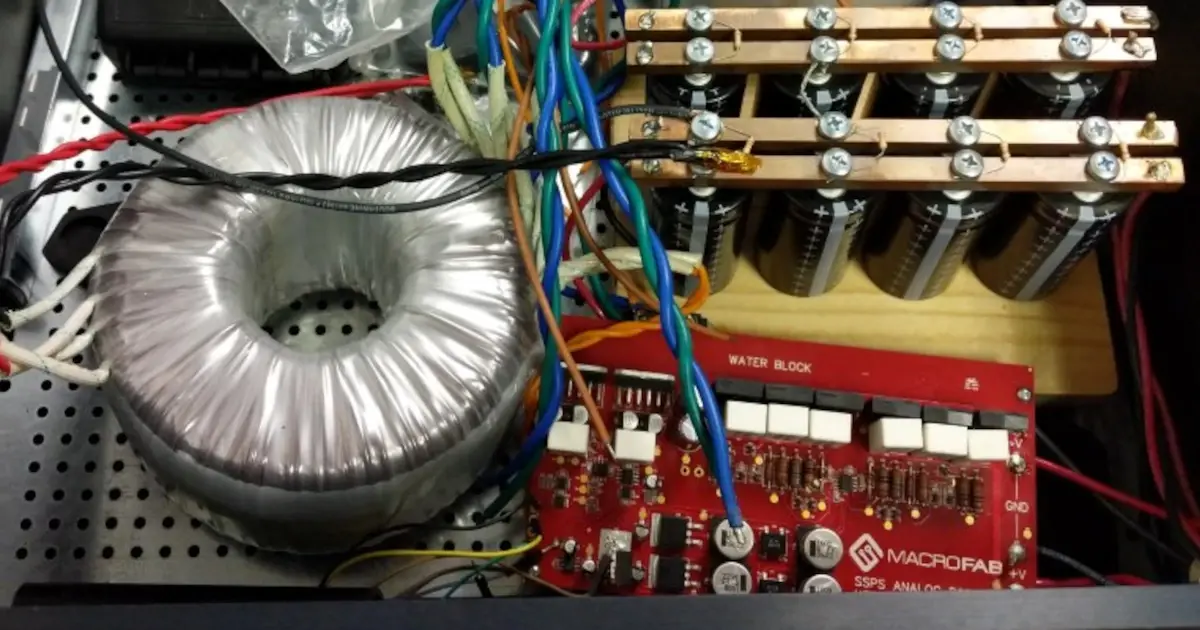Related Topics
Let’s Segway into the Next Topic
AI and ChatGPT have been in the news about how it will change world views or will it be relegated, making sure NPCs in video games don’t repeat dialog?
The Wheels Are Finally Off
How easy is it to make a retro gaming console? Stephen breaks down his design and build criteria that involves no custom PCBs.
Choose Your Own Adventure Level Shifter
Parker and Stephen examine an interesting mute circuit Stephen designed for his amplifier and the SN74LVC8T245.
Other Resources
Circuit Break Podcast
Webinars
Videos
Tour MacroFab's ITAR-Compliant Facility
May 16, 2018, Episode #120
- Stephen
- Moving to Denver, Colorado
- Podcast will still go on in a remote form, similar to another popular electronics podcast
- Parker
- Posted on his blog recently and will be doing more!
- R.F.O.
- The Nintendo switch has been hacked – via hardware!
- First discovered by fail0verflow
- Switch runs on the Nvidia Tegra X1 platform
- Put the switch into a USB recovery mode by shorting out some pins on the Joy-Con Controller
- Then trick the Switch’s USB stack by sending a bad “length” argument
- Allows homebrew and linux to run on the Switch
- Say Hello to Android Things 1.0
- Enables you to build and maintain Internet of Things devices at scale.
- Provides hardware, rich dev api’s, and back end infrastructure
- System-on-Modules (SoMs) – 3 year “long term support”
- Raspberry Pi 3 Model B support for prototyping only
- Listener email: “A topic I’d be interested in hearing you guys discuss is how you go about intentionally improving your engineering skills. I’ve been thinking a lot recently about the idea of achieving “mastery” of a skill and I’m quite interested in other people’s take on the topic.”
- The Nintendo switch has been hacked – via hardware!
- Announcements
- Twitter Chat Info
- May 18th Friday at 1PM CST
- Use #MacroFab to join the conversation
- MacroFab Monthly Electronics Meetup
- May 23rd 6PM at MacroFab HQ in Houston
- Brandon Satrom from Particle. Going to give a talk about IoT fundamentals.
- Houston Hardware Happy Hour
- June 7th at Slowpokes
- Bring hacks and hang out
- Twitter Chat Info
Visit our Slack Channel and join the conversation in between episodes and please review us, wherever you listen (PodcastAddict, iTunes). It helps this show stay visible and helps new listeners find us.

Schematic for the design block Parker is working on for the EP4CE6E22C8N FPGA.

Layout for the design block Parker is working on for the EP4CE6E22C8N FPGA.
About the Hosts

Parker Dillmann
Parker is an Electrical Engineer with backgrounds in Embedded System Design and Digital Signal Processing. He got his start in 2005 by hacking Nintendo consoles into portable gaming units. The following year he designed and produced an Atari 2600 video mod to allow the Atari to display a crisp, RF fuzz free picture on newer TVs. Over a thousand Atari video mods where produced by Parker from 2006 to 2011 and the mod is still made by other enthusiasts in the Atari community.
In 2006, Parker enrolled at The University of Texas at Austin as a Petroleum Engineer. After realizing electronics was his passion he switched majors in 2007 to Electrical and Computer Engineering. Following his previous background in making the Atari 2600 video mod, Parker decided to take more board layout classes and circuit design classes. Other areas of study include robotics, microcontroller theory and design, FPGA development with VHDL and Verilog, and image and signal processing with DSPs. In 2010, Parker won a Ti sponsored Launchpad programming and design contest that was held by the IEEE CS chapter at the University. Parker graduated with a BS in Electrical and Computer Engineering in the Spring of 2012.
In the Summer of 2012, Parker was hired on as an Electrical Engineer at Dynamic Perception to design and prototype new electronic products. Here, Parker learned about full product development cycles and honed his board layout skills. Seeing the difficulties in managing operations and FCC/CE compliance testing, Parker thought there had to be a better way for small electronic companies to get their product out in customer's hands.
Parker also runs the blog, longhornengineer.com, where he posts his personal projects, technical guides, and appnotes about board layout design and components.

Stephen Kraig
Stephen Kraig is a component engineer working in the aerospace industry. He has applied his electrical engineering knowledge in a variety of contexts previously, including oil and gas, contract manufacturing, audio electronic repair, and synthesizer design. A graduate of Texas A&M, Stephen has lived his adult life in the Houston, TX, and Denver, CO, areas.
Stephen has never said no to a project. From building guitar amps (starting when he was 17) to designing and building his own CNC table to fine-tuning the mineral composition of the water he uses to brew beer, he thrives on testing, experimentation, and problem-solving. Tune into the podcast to learn more about the wacky stuff Stephen gets up to.
Special thanks to whixr over at Tymkrs for the intro and outro!
Related Podcasts

Choose Your Own Adventure Level Shifter
Parker and Stephen examine an interesting mute circuit Stephen designed for his amplifier and the SN74LVC8T245.

Interview with Ben Heck of The Ben Heck Show
This week Stephen and Parker have Benjamin Heckendorn of The Ben Heck Show as a guest!

The Wheels Are Finally Off
How easy is it to make a retro gaming console? Stephen breaks down his design and build criteria that involves no custom PCBs.

Let’s Segway into the Next Topic
AI and ChatGPT have been in the news about how it will change world views or will it be relegated, making sure NPCs in video games don’t repeat dialog?
About MacroFab
MacroFab offers comprehensive manufacturing solutions, from your smallest prototyping orders to your largest production needs. Our factory network locations are strategically located across North America, ensuring that we have the flexibility to provide capacity when and where you need it most.
Experience the future of EMS manufacturing with our state-of-the-art technology platform and cutting-edge digital supply chain solutions. At MacroFab, we ensure that your electronics are produced faster, more efficiently, and with fewer logistic problems than ever before.
Take advantage of AI-enabled sourcing opportunities and employ expert teams who are connected through a user-friendly technology platform. Discover how streamlined electronics manufacturing can benefit your business by contacting us today.